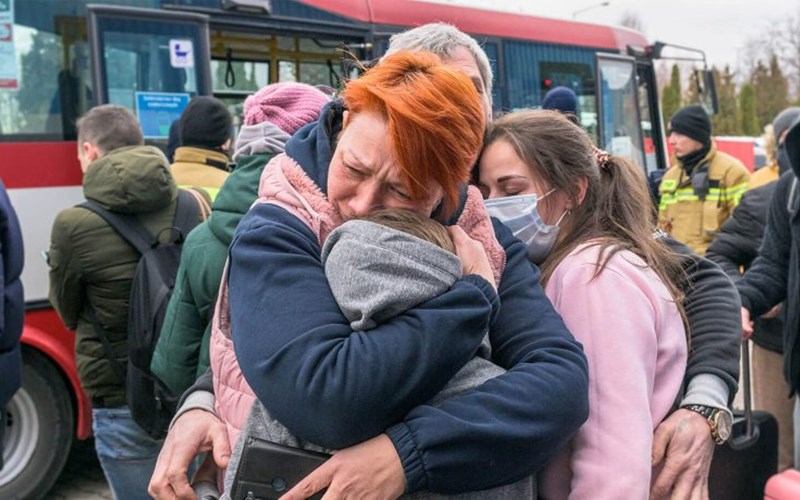Slavic Gospel Association – founded in 1920s and 1930s by Rev. Peter Deyneka, a refugee from Belarus – is partnering with Baptist churches in Ukraine to distribute humanitarian aid to some of the four to five million people who are fleeing the oncoming Russian military. American Family Radio's Rev. Joseph Parker, host of "The Hour of Intercession," spoke with SGA president Michael Johnson, who said they are raising money for a network of 2,200 to 2,300 Baptist churches.
"They essentially purchase the food and the resources over there, and then they will be distributing through these large churches to smaller churches in the region as well as to individuals, so that they can reach as many people as possible," Johnson explained. "Knowing that this [invasion] was coming, the leadership of those churches put plans in place to make this happen."
The supplies being distributed includes bags of groceries, winter warmth packages with blankets and clothes, and family survival kits (which include food, blankets, water, and medicine), according to the SGA website.
But it doesn't stop there. The SGA leader says in addition to distributing the humanitarian aid, Ukrainian pastors are sharing the gospel with a very spiritually open country.
"Every encounter opens up an opportunity to share the gospel with these people," he shared. "They've stayed behind. These are brave, courageous individuals who realize that God has allowed this to happen for the advancement of His purposes – and His purposes are to see more and more people come to faith in Christ in those countries."
According to Johnson, Ukraine isn't the only country being affected by the war. "We have worked in Russia, through the churches [there], because people have been displaced there as well," he described. "But also in some of the Eastern European countries that we have connections to also, to minister to the refugees from Ukraine."
Hope and a hospital
A familiar ministry also on the ground in Ukraine is helping people impacted by the war: Franklin Graham's Samaritan's Purse. Graham spoke with Tony Perkins Tuesday on the "Washington Watch" radio program.
 "We can't make political decisions [at Samaritan's Purse], but we can make decisions to help people – and that's what we're there to do and we want to do it always in Jesus' name," said Graham. "I want the people of Ukraine to know that God loves them and cares for them, that Jesus Christ died for their sins like He died for mine, and He rose from the grave – and I want them to have that hope that I have and that the rest of us have."
"We can't make political decisions [at Samaritan's Purse], but we can make decisions to help people – and that's what we're there to do and we want to do it always in Jesus' name," said Graham. "I want the people of Ukraine to know that God loves them and cares for them, that Jesus Christ died for their sins like He died for mine, and He rose from the grave – and I want them to have that hope that I have and that the rest of us have."
And while Graham says the Ukranian churches are thrilled to have any kind of help, "the most important thing we can do, all of us, is to pray."
"Pray for the churches, pray for the believers; and as Samaritan's Purse goes, pray that we'll be safe and God will protect us and lead us to the right locations," said Graham.
"Ukraine is going through immeasurable suffering and I cannot imagine what these families are going through – having bombs dropped on them, having to flee for their lives, all the things that they planned for their future are being wiped out by this invasion … and this is something that's probably going to get worse."
Samaritan's Purse, he added, plans to put a field hospital in Ukraine – and the needs for that are great.
"We need Christian doctors and nurses and we need logistics people … because when you set up a hospital like that, it's one thing to have the doctors and nurses; but it takes a whole team of people to keep that hospital up and running," said Graham. "We've got people already signed up. We just need more."
That field hospital will be equipped with 30 beds, an operating room, an ICU, an emergency room, a pharmacy, and its own water and sanitation; and will accommodate as many as 100 patients a day.
The first phase of the emergency field hospital is scheduled to begin on Friday when the ministry's DC-8 cargo plane leaves Greensboro, North Carolina.







